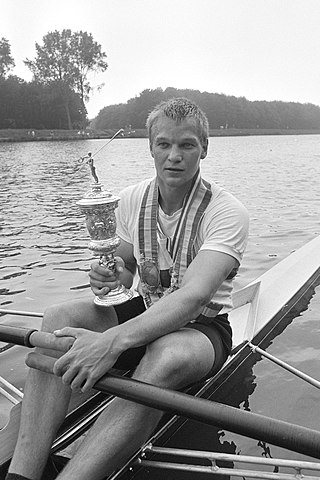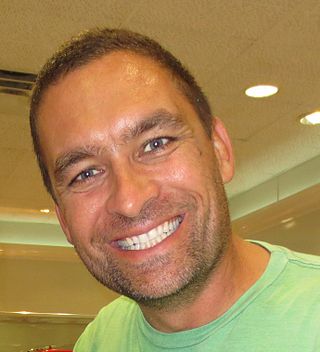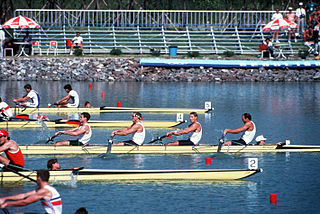
The men's single sculls event was a rowing event conducted as part of the Rowing at the 1964 Summer Olympics programme. It was held from 11 to 15 October at the Toda Rowing Course. There were 13 competitors from 13 nations, with each nation limited to a single boat in the event. The event was won by Vyacheslav Ivanov of the Soviet Union, his third consecutive victory in the event. Ivanov's three gold medals in the event remains tied for the best results for any individual single sculler ; only Ekaterina Karsten has more medals in (women's) single sculls, though she took only two golds along with a silver and a bronze. The second spot on the podium was also a repeat of 1960; Achim Hill of the United Team of Germany became the sixth man to win multiple single sculls medals by repeating as silver medalist. Bronze this time went to Gottfried Kottmann of Switzerland, that nation's first medal in the event since 1924.

The men's coxed four event was a rowing event conducted as part of the Rowing at the 1964 Summer Olympics programme. It was held from 11 to 15 October. There were 16 boats from 16 nations, with each nation limited to a single boat in the event. The event was won by the United Team of Germany, the nation's second consecutive victory in the men's coxed four. The two medals placed the United Team of Germany in a tie for second-most all-time with Switzerland and Italy; Germany had the most with four. Italy earned its third straight medal in the event, all of different colours, with a silver in Tokyo. The bronze medal went to the Netherlands, the nation's first medal in the event since 1900.

The men's single sculls competition at the 1992 Summer Olympics in Barcelona was held from 27 July to 1 August at Lake of Banyoles. The event was an open-style, individual rowing event conducted as part of the Rowing at the 1992 Summer Olympics programme. There were 22 competitors from 22 nations, with each nation limited to a single boat in the event. The event was won by Thomas Lange of Germany, the fourth man to successfully repeat as Olympic champion. It was the first appearance of "Germany" since 1936, though German rowers representing the United Team of Germany, West Germany, and East Germany had won 10 medals in 8 Games from 1960 to 1988. Václav Chalupa of Czechoslovakia took silver, that nation's first medal in the men's single sculls. Poland's Kajetan Broniewski earned that nation's first medal in the event since 1960 with his bronze.

The men's single sculls competition at the 1988 Summer Olympics took place at Misari Regatta, South Korea. The event was held from 19 to 24 September. It was the 20th appearance of the event, which had been held at every Olympic Games since the introduction of rowing in 1900. NOCs were limited to one boat apiece; 22 sent a competitor in the men's single sculls. Thomas Lange of East Germany won the event, denying Pertti Karppinen a record fourth-straight win and starting a two-Games winning streak of his own. Peter-Michael Kolbe of West Germany took his third silver, joining Karppinen and Vyacheslav Ivanov as three-time medalists in the event. New Zealand earned its first medal in the event since 1920, with Eric Verdonk taking bronze.

The men's single sculls competition at the 1996 Summer Olympics took place at Lake Lanier, Atlanta, United States of America. The event was held from 21 to 27 July 1996. There were 21 competitors from 21 nations, with each nation limited to a single boat in the event. The event was won by Xeno Müller of Switzerland, the nation's first victory in the event and first medal of any color since 1960. Derek Porter's silver was Canada's best-ever result in the event, over bronze medals in 1912 and 1984. Two-time defending champion Thomas Lange of Germany settled with a bronze medal this time, becoming the fourth man to win three medals in the event.
The women's double sculls competition at the 1992 Summer Olympics took place at took place at Lake of Banyoles, Spain.

The men's coxed four competition at the 1988 Summer Olympics took place at Misari Regatta, South Korea. It was held from 19 to 24 September. There were 14 boats from 14 nations, with each nation limited to a single boat in the event. The event was won by East Germany, returning to the top of the podium after the Soviet-led boycott in 1984 prevented the East Germans from defending their 1980 Olympic title. Silver went to Romania, its first medal in the men's coxed four. New Zealand took a second consecutive bronze medal in the event.
The women's double sculls competition at the 1976 Summer Olympics took place at Notre Dame Island Olympic Basin, Canada. It was the first time the event was contested for women.
The women's single sculls competition at the 1988 Summer Olympics took place at took place at Han River Regatta Course, South Korea.
The women's double sculls competition at the 1988 Summer Olympics took place at took place at Han River Regatta Course, South Korea.
The women's quadruple sculls competition at the 1988 Summer Olympics took place at took place at Han River Regatta Course, South Korea.
The men's quadruple sculls competition at the 1992 Summer Olympics took place at took place at Lake of Banyoles, Spain.
The men's coxless pair competition at the 1992 Summer Olympics took place at took place at Lake of Banyoles, Spain.

The men's coxed pair competition at the 1992 Summer Olympics took place at Lake of Banyoles, Spain. It was held from 28 July to 2 August. There were 16 boats from 16 nations, with each nation limited to one boat in the event. The event was won by brothers Greg and Jonny Searle and coxswain Garry Herbert of Great Britain, the nation's first victory in the event. It was the third consecutive Games with brothers winning as the rowers; Italy's Carmine Abbagnale and Giuseppe Abbagnale had won in 1984 and 1988. They, along with longtime cox Giuseppe Di Capua, took silver this year, becoming the only crew to win three medals together in the event. Bronze went to Romanians Dimitrie Popescu, Nicolae Țaga, and cox Dumitru Răducanu. Popescu and Răducanu had been on the 1984 silver medal team, making them the 16th and 17th—and final—men to earn multiple medals in the event.
The men's coxless four competition at the 1992 Summer Olympics took place at took place at Lake of Banyoles, Spain.

The men's coxed four competition at the 1992 Summer Olympics took place at took place at Lake of Banyoles, Spain. It was held from 27 July to 1 August. There were 12 boats from 12 nations, with each nation limited to a single boat in the event. The event was won by Romania, the nation's first victory in the event; the Romanian team had taken silver in 1988. Germany, recently re-united, took silver in 1992; East Germany had won gold in 1988. Two men returned from the 1988 podium to medal again in 1992: Dimitrie Popescu of Romania and Hendrik Reiher of the former East German team. They were the eighth and ninth men to earn multiple medals in the event; due to the removal of the men's coxed four from the programme, they would be the last. Bronze went to Poland, the nation's fourth bronze medal in the coxed four.
The women's single sculls competition at the 1992 Summer Olympics took place at took place at Lake of Banyoles, Spain.
The women's quadruple sculls competition at the 1992 Summer Olympics took place at took place at Lake of Banyoles, Spain.
The women's coxless pair competition at the 1992 Summer Olympics took place at took place at Lake of Banyoles, Spain.
The women's quadruple sculls competition at the 1996 Summer Olympics in Atlanta, Georgia took place at Lake Lanier.







